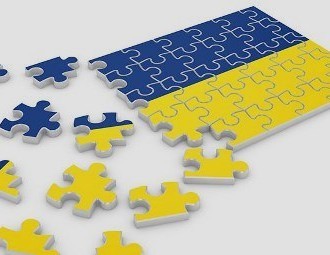Jury Vdovenko: Decentralization of power is a chance for Ukraine to become a real European country

With all the news from the front reform of the self-government is hardly covered in media, although the supporters of the reform think that this reform will enable Ukraine integrate into Europe.
“Modern Ukraine is a centralized state. The powers of the local self-government are limited; the management at the main places is organized by the officials appointed by the centre”, is said in the “Initiative of support of administrative reform and decentralization”
Supporters of the reform note that centralization creates a whole number of problems for Ukraine, such as “corruption, ineffective use of funds, underfunding of local budgets, concentration of powers at higher levels of authorities”.
The reform on decentralization is just about to start, transmitting both the powers and the sources of funding to the level of local self-government.
Last year adherents of decentralization among Ukrainian authorities held active consultations with Polish politicians and experts, notes Jury Vdovenko, a consultant of the Ministry for Ukraine’s regional development, construction, and housing and communal services, Vice-President of the Polesie Fund for international and regional initiatives.
- We use common European experience, but more Poland-oriented, - said Jury Vdovenko in the interview with “EuroBelarus” Information Service. – I think that Polish experience is the closest to Ukraine because of some mental issues, territory, and history. The participation of Polish experts in this reform allows avoiding the mistakes that were made in Poland during the decade of reforms.
- What mistakes do Polish experts warn against?
- We are carefully studying the recommendation that the Polish side gives us in the question of reforms of the system of medical institutions and local police: to avoid excessive decentralization, as fragmentation of funds can lead to no qualitative medical aid and excessive local powers. Decentralization shouldn’t seriously influence the system of education. In fact, we have an opportunity to avoid mistakes made by Poland.
- Can we say that the reform unifies Ukraine’s system of self-government with the European system?
- At least it will get closer to the common-European, where the principle of self-government prevails, even though the model varies from country to country. The reform in Poland is the youngest one, and it already took into account experience of western European countries.
- When being a part of the Polish–Lithuanian Commonwealth, western Ukraine already had the system of gminas and powiatas (units of local government and administration). It is eastern parts of Ukraine that are problematic for the reform, isn’t it?
- I wouldn’t pose the question as “West-East” opposition, as any Ukrainian region has both the people who are ready to take upon themselves responsibility and those who refuse powers and responsibility. The threat for the reform rather results from unpreparedness of local authorities to use the opportunities that the power gives them. There was no assessment by regions; however, I admit that for now there are less initiative people than those who are ready to work on the change in the system of self-government.
There is political will to the reform on the part of the Ukraine President, political forces also declared their readiness to reforms. Soon parliament is to introduce changes to the Constitution to implement them through Ministers in the future. This is going to be an all-embracing reorganization indeed.
-
03.01
-
07.10
-
22.09
-
17.08
-
12.08
-
30.09










































